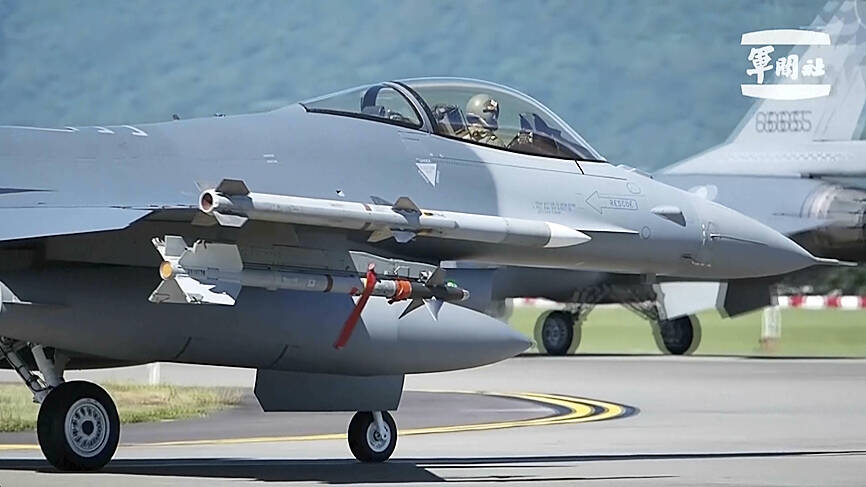A portion of funds for the procurement of US arms totaling approximately NT$24.4 billion is being held up in the US, a report by the National Audit Office said.
The total amount for the procurement included a certain percentage that US authorities would set aside in case Taiwan terminated the contract midway, which was in line with regulations stipulated in section C9.9.1.5.4 of the US Department of Defense Security Assistance Management Manual, the office said.
“We have switched to providing that percentage through a letter of guarantee from a bank. However, if the issuing bank is not a US bank, it must obtain a license from the US Federal Reserve, according to US regulations,” it said. “Since the US branches of Taiwan’s banks have failed to secure that license, the funds are being held up.”

Photo courtesy of the Taiwan Military News Agency via AP
The National Audit Office asked the ministry at the end of 2022 to have the contract-termination funds provided to the US contractor through a letter of guarantee issued by a bank that complies with US regulations, rather than transferring the funds from the ministry’s budget.
In response, the Ministry of National Defense said that its representatives to the US were communicating with the US department’s Defense Security Cooperation Agency (DSCA) on getting the US Federal Reserve to provide a Taiwanese bank with a license.
The ministry in February last year formed a task force to look at how to issue letters of guarantee that comply with US regulations, and had aimed to meet the requirements by the end of this year, the audit office said.
However the banks the ministry had been working with failed to receive licenses by the end of last year as planned, it said.
“The Ministry of National Defense contacted the DSCA twice last year to evaluate relaxing the eligibility criteria for banks to issue credit,” it said. “However, the DSCA said this was not possible since it involved policy adjustments which could harm the rights and interests of the US.”
The US Department of State, the US Department of the Treasury and other US agencies are evaluating rules for arms procurement from US contractors, and hope to find a consistent solution for all global purchasers, it said.
However, it is unknown when this can be completed, it added.

An essay competition jointly organized by a local writing society and a publisher affiliated with the Chinese Communist Party (CCP) might have contravened the Act Governing Relations Between the People of the Taiwan Area and the Mainland Area (臺灣地區與大陸地區人民關係條例), the Mainland Affairs Council (MAC) said on Thursday. “In this case, the partner organization is clearly an agency under the CCP’s Fujian Provincial Committee,” MAC Deputy Minister and spokesperson Liang Wen-chieh (梁文傑) said at a news briefing in Taipei. “It also involves bringing Taiwanese students to China with all-expenses-paid arrangements to attend award ceremonies and camps,” Liang said. Those two “characteristics” are typically sufficient

A magnitude 5.9 earthquake that struck about 33km off the coast of Hualien City was the "main shock" in a series of quakes in the area, with aftershocks expected over the next three days, the Central Weather Administration (CWA) said yesterday. Prior to the magnitude 5.9 quake shaking most of Taiwan at 6:53pm yesterday, six other earthquakes stronger than a magnitude of 4, starting with a magnitude 5.5 quake at 6:09pm, occurred in the area. CWA Seismological Center Director Wu Chien-fu (吳健富) confirmed that the quakes were all part of the same series and that the magnitude 5.5 temblor was

The Central Weather Administration has issued a heat alert for southeastern Taiwan, warning of temperatures as high as 36°C today, while alerting some coastal areas of strong winds later in the day. Kaohsiung’s Neimen District (內門) and Pingtung County’s Neipu Township (內埔) are under an orange heat alert, which warns of temperatures as high as 36°C for three consecutive days, the CWA said, citing southwest winds. The heat would also extend to Tainan’s Nansi (楠西) and Yujing (玉井) districts, as well as Pingtung’s Gaoshu (高樹), Yanpu (鹽埔) and Majia (瑪家) townships, it said, forecasting highs of up to 36°C in those areas

The brilliant blue waters, thick foliage and bucolic atmosphere on this seemingly idyllic archipelago deep in the Pacific Ocean belie the key role it now plays in a titanic geopolitical struggle. Palau is again on the front line as China, and the US and its allies prepare their forces in an intensifying contest for control over the Asia-Pacific region. The democratic nation of just 17,000 people hosts US-controlled airstrips and soon-to-be-completed radar installations that the US military describes as “critical” to monitoring vast swathes of water and airspace. It is also a key piece of the second island chain, a string of